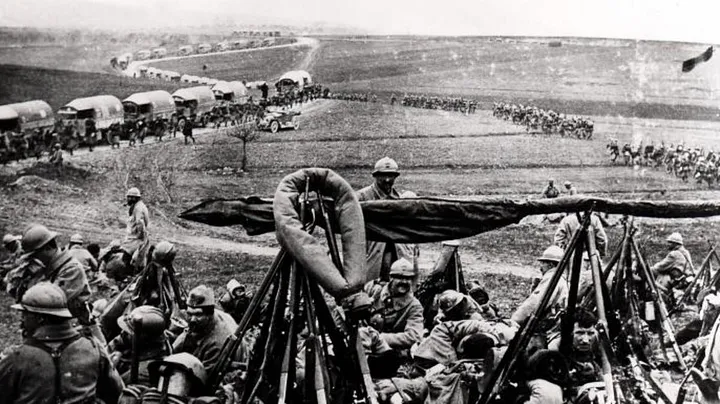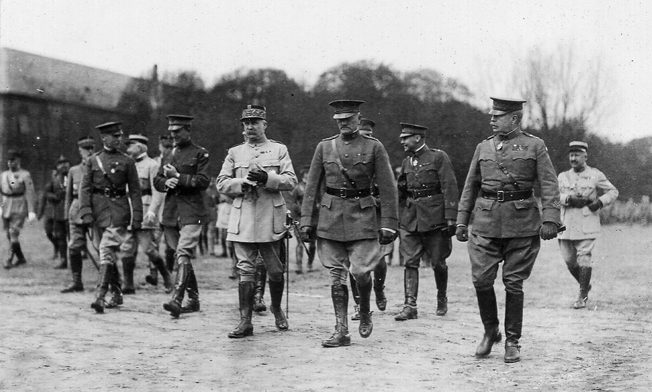Charles de Gaulle and Marshal Philippe Pétain represent contrasting figures in French history during World War II. De Gaulle symbolised resistance, French sovereignty, and national pride, while Pétain's collaboration with the Nazis and authoritarian rule greatly overshadowed his earlier reputation as a World War I hero.
Today, de Gaulle is celebrated as a hero; Petain, a traitor.
So who was this man who fell from grace so spectacularly? Was he a villain or was he simply a man who had never really changed at all? Was it simply his reaction to the world in which he found himself?
Marshal Pétain's rise to prominence began during World War I, where he demonstrated his military prowess and leadership abilities. As a general, Pétain led the French forces in several crucial battles, most notably during the Battle of Verdun in 1916.
The Battle of Verdun, which took place from February 21 to December 18, 1916, was one of the longest and bloodiest battles of World War I. It was fought between the German and French armies near the town of Verdun in northeastern France.
Verdun held a vital strategic position, as it was located on a stretch of high ground that formed a natural defense barrier. It was also a symbolic city, considered a stronghold of French national pride. The battle began with a massive German offensive on February 21, 1916. The initial assault involved a fierce artillery bombardment that lasted for several days, pounding the French positions and causing massive destruction. Following the bombardment, German troops advanced towards the French lines, aiming to break through and capture the city.
The French, under the command of General Philippe Pétain, mounted a determined defense at Verdun. Pétain was a Realist. He assessed the situation and implemented a strategy of defense in depth, whereby a series of fortified lines and strong points were established to slow down the German advance. Pétain emphasized the importance of resupplying and rotating troops, prioritizing their well-being, and instilling a sense of resilience and morale among the French soldiers.
The Battle of Verdun soon devolved into a brutal war of attrition, characterized by trench warfare and heavy casualties on both sides. The Germans attempted multiple offensives to break through the French lines, while the French fiercely resisted, launching counter-attacks whenever possible. The fighting was characterized by close-quarters combat, artillery barrages, and the extensive use of poison gas.

The main reason the French were able to fight for so long was because of the transportation of munitions down a single road into Verdun. The road was dubbed Voie Sacree’, the Sacred Way.
The battle had a profound impact on the psyche of both nations. The sheer scale of casualties, estimated at around 700,000 on both sides, shocked the world and highlighted the brutality and futility of trench warfare. Verdun became a symbol of French resilience and determination, as the French army successfully defended the city against the German onslaught.
Pétain's success at Verdun earned him the adoration of the French people, who hailed him as a national hero.

Following a ceremony on April 29, 1919, during which a number of French and American officers received decorations, Marshal Philippe Pétain of France and American General John J. Pershing walk from the assembly area near Metz.
Meanwhile, one of the soldiers serving under Petain was a young man named Charles de Gaulle. Born in 1890, he was attracted to the military life. In 1913, de Gaulle, a second lieutenant, joined a regiment commanded by Colonel Philippe Pétain. Their careers and lives would be entangled for decades in ways neither of them could have ever imagined.
Early in World War I, de Gaulle was promoted to captain and received the Croix de Guerre. In 1916 he saw action at Verdun, a battle that came to epitomize the slaughter and carnage of the First World War. It was in the “meat-grinder” of Verdun, where the French suffered more than 500,000 casualties, that Pétain distinguished himself. Wounded three times, de Gaulle was taken prisoner and spent the remainder of the war in German POW camps. Unreconciled to his new status as a prisoner of war, de Gaulle attempted to escape, unsuccessfully, five times.
Following Germany’s defeat and his release, de Gaulle’s talents were recognised by the French military establishment. He taught in the early 1920s at Saint-Cyr, and then studied strategy and tactics at France’s prestigious École Supérieure de Guerre. During the mid-1920s, de Gaulle worked for Pétain, who mentored him.
Fast forward to World War II.

On the 10th of May 1940, the German military launched the long-expected invasion of France and the Low Countries. The breakthrough the Germans accomplished via the Ardennes shocked French and British leadership. Appointed brigadier-general, de Gaulle led the 4th Armored Division. In late May and early June, his division gave a good account of itself against the Germans at Abbeville, near the mouth of the Somme River in northern France. Around him, though, things fell apart with horrid rapidity.
On June 6, 1940, De Gaulle was promoted to undersecretary of state for defense in Paul Reynaud’s government. In his new post, he engaged in frequent exchanges with the British government, now led by Winston Churchill. During these dark days, he witnessed the collapse of Third Republic France, the only France he had ever known. German soldiers entered Paris in triumph on June 14, something they had never done in World War I. It was time to evacuate.
Brigadier-General de Gaulle’s very arrival in England was dramatic. On June 16, Reynaud stepped down, succeeded by de Gaulle’s aged former mentor, Marshal Pétain. The next day, de Gaulle boarded a British aircraft in Bordeaux, the port city in the southwest of France where the French government had fled as the Germans approached Paris. With his aide-de-camp, Lieutenant Geoffroy de Courcel, and British liaison officer Edward Spears, he made it safely to London. That very day, though, Pétain requested armistice terms from the Germans. The old marshal would soon head, along with Pierre Laval, a government in Vichy that defined collaborationism for generations to come.

De Gaulle vehemently opposed the Vichy regime and collaborated with the Allies to form the Free French Forces. He called on the French population to resist German occupation and refused to recognise the legitimacy of the Vichy government. De Gaulle actively worked to unify various resistance movements under the banner of Free France and sought to restore French sovereignty.
In contrast, Petain gave up and cooperated with Nazi Germany on various levels. Pétain's government accepted German military occupation and actively collaborated in political, economic, and military matters. The French police and bureaucracy assisted the Germans in enforcing their policies, leading to the arrest, deportation, and persecution of thousands of Jews and political dissidents.
Under the Vichy regime, anti-Semitic legislation was enacted, reflecting the influence and ideology of Nazi Germany.
-
The Vichy regime cracked down on dissent and political opposition. It established an authoritarian rule, limiting freedom of speech, press, and assembly. The regime sought to control and regulate various aspects of public life.
-
It implemented economic policies that primarily served German interests. France's industrial and agricultural resources were harnessed to support the German war effort. The French economy became increasingly dependent on Germany, and collaboration extended to economic and trade agreements that favored the German war machine.
In short, it was a puppet regime for business interests.
The French Resistance, inspired by de Gaulle, sought to undermine and challenge the authority of the regime. As Allied forces advanced and liberated France in 1944, the Vichy government lost power, and its leaders faced trials for collaboration and treason.
Pétain's collaboration with the Nazis has left an indelible stain on his legacy. After the war, he was arrested and tried for treason, found guilty, and sentenced to death. However, due to his age and his contributions in World War I, his sentence was commuted to life imprisonment. Pétain spent the rest of his life in prison and died in 1951.
To try and summarise these two men, both war heroes, could be complex and take decades. But maybe it is as simple as this.
Petain was a realist and saw things for what they were. He tried his best to adapt and survive. De Gaulle, on the other hand, was a visionary. He saw things as they were and tried to change things.
We need Realists. We need Visionaries. But ultimately what we need are Winners.
Petain backed the wrong side. I have to wonder how this will work out in 2023 for those that back Bud Light, Target, Ukraine, Biden, child abuse, climate change, and the destruction of normality.
I know where I stand.
Vive La Resistance.
BLOG COMMENTS POWERED BY DISQUS



















































